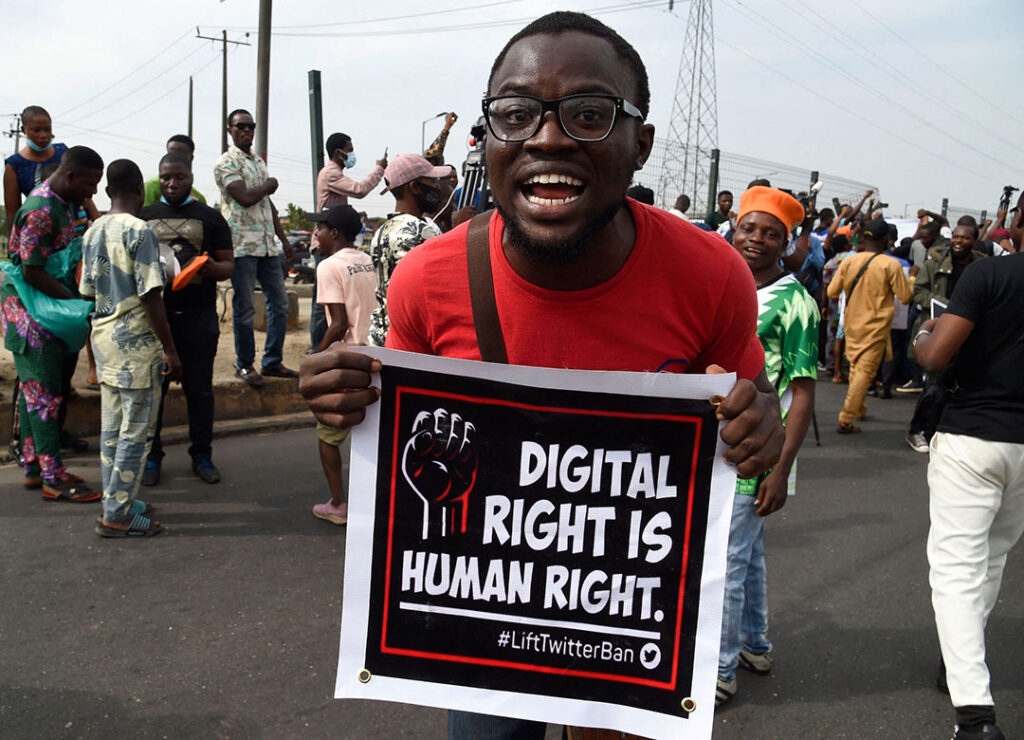ADF STAFF
When protests in South Africa boiled over into violence and looting in July, much of the energy driving the violence came from social media.
Across the continent, social media has become a mechanism for amplifying already heightened emotions, from the ongoing conflicts in Ethiopia to political protests in Eswatini to extremist propaganda across the Sahel. It also has become a vehicle for false information about the COVID-19 pandemic and public health efforts to control it.
In response to many of these situations, leaders across Africa have hit the “off” switch on their nations’ internet systems, a decision that disrupts the lives of millions of internet-dependent citizens and does significant harm to their national economies.
“There are examples of ways so to work together to ring-fence extremism,” Karen Allen, a senior consultant for the Institute for Security Studies, said during a recent webinar on extremism and technology held by the Africa Center for Strategic Studies. “Strategies toward social media need to be more proactive than reactive.”
The widespread use of social media platforms such as Facebook, Twitter and WhatsApp have undercut the ability of political leaders to control the public dialogue through legacy media platforms such as newspapers, television and radio.
At the same time, social media has created an environment in which users can be flooded with the kind of disinformation, misinformation and propaganda that can turn a peaceful protest into a violent mob.
The solution, according to Allen and Nigerian journalist Abdullahi Murtala, is for governments to take a more deliberate approach by countering misinformation with true information through their own channels and to have serious discussions with social media companies about doing a better job of regulating violent or inflammatory content on their sites.
“It would be better to engage social media companies to make it harder for terrorists or extremists to use them, rather than shutting them down,” Murtala said.
So far, however, many African leaders continue to take a heavy-handed approach. In recent years, Burundi, Chad, Ethiopia, Guinea, Mali, Tanzania, Togo and Zimbabwe have shut down the internet completely during times of unrest.
In June, Nigerian President Muhammadu Buhari banned Twitter from the country after the company’s content moderators took down one of his tweets for violating its rules about “abusive behavior.”
Nearly 25 million Nigerian use social media, a number projected to grow to nearly 45 million by 2025. Buhari’s decision to block Twitter directly affected millions of Nigerian users, including e-commerce businesses that advertise on the site. Internet advocacy group Netblocks estimated that the shutdown cost Nigeria $709 million.
Critics say the ban also showed that the country is a risky environment for foreign investors.
“The Twitter ban is certainly taking a toll on e-commerce and is making things even harder for many young Nigerians who have leveraged technology for their economic empowerment in significant ways,” activist and writer Fareeda Abdulkareem told Foreign Policy magazine.
Buhari lifted his ban on Twitter in October on the condition that the company set up an office in Nigeria, which would make it subject to new media laws that criminalize criticism of the government.
Countries across Southern Africa are creating rules designed to stop what their supporters describe as “social media abuse.” Civil society proponents see it as a way to shut down dissent.
“The regional bloc’s ambition to control the content posted on social media platforms is undoubtedly sinister, especially in a region fraught with hotly disputed elections and violent spurts of authoritarian crackdowns on mundane civic activism and political opposition,” South African political commentator Tafi Mhaka recently wrote in a column published by Al-Jazeera.
Allen suggests that African countries need to commit to free expression on social media while providing consequences for malicious behavior, such as publishing deliberately altered images or video with the intent to mislead viewers.
She cites South Africa’s Cybercrimes Act, which took effect December 1. The law makes weaponizing social media a crime and bans using social media to incite damage to people or property.
But, Allen notes, even that law has its flaws: “Simply resharing deliberately manipulated content that is malicious could make any one of us unwittingly assistants in committing a crime.”
When it comes to tackling extremism online, Allen and Murtala emphasized the need to engage social media providers directly with a focus on the effect extremism can have on their brands.
“The threat of reputational damage is very real,” Allen said. “Does Facebook want to be associated with extremist terror?”

